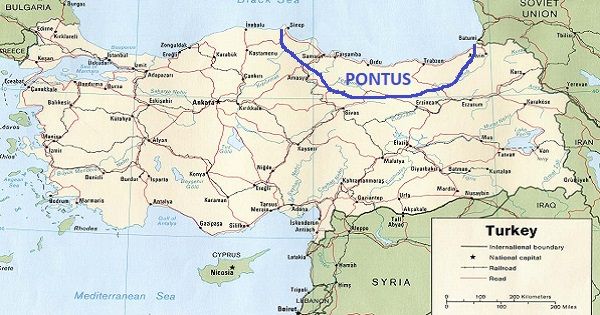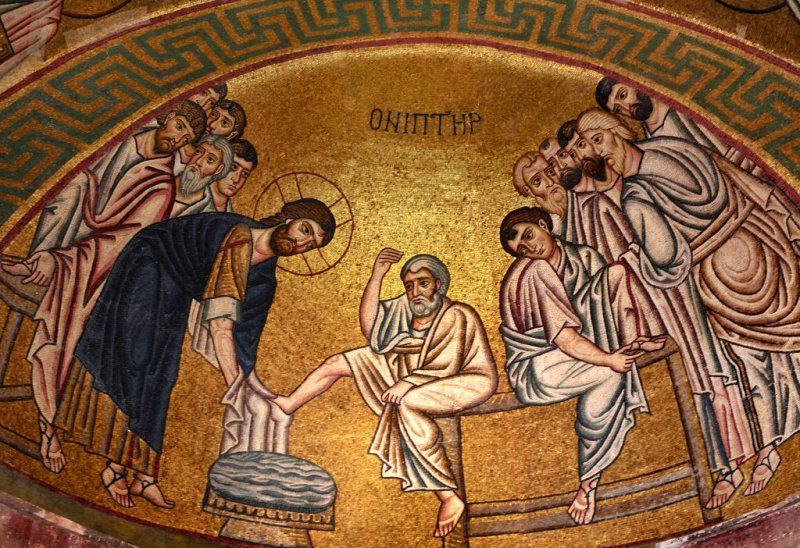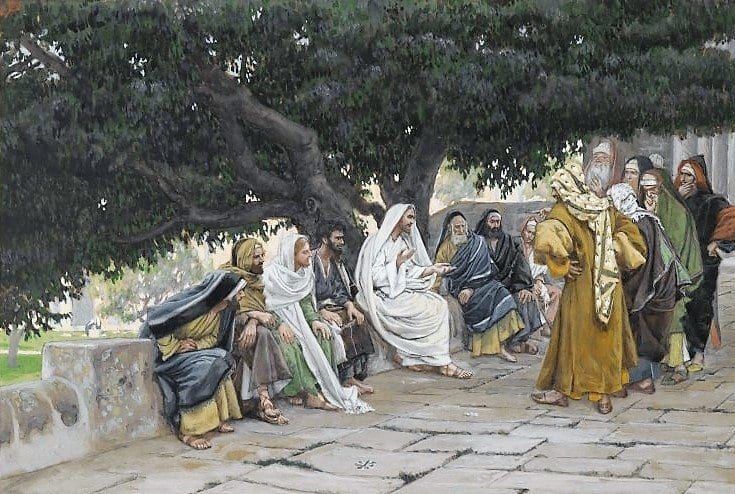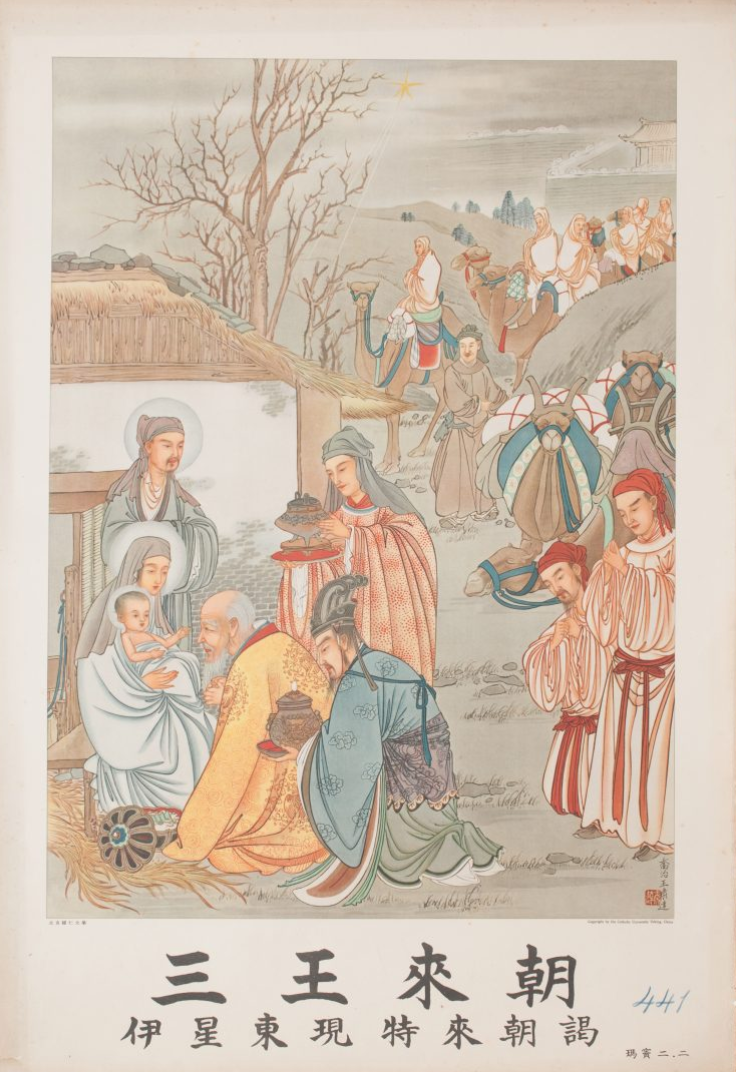Love God and Lover Are Inseparable Refuse to Be a Spiritual Lone Ranger
Basil Spirituality Introduction II
In the last article of the official account, we talked about the big Basil's belief that everyone has the heart to love God, and everyone can love God. This article will introduce the topic in "Rule Three" of the "Long Guild Rules": the relationship between loving God and loving people.
Background of the "Long Meeting Rules"

Before entering the topic, let's take a look at the writing background of the "Long Guild Rules". In Basil's time, people longed to live a holy life according to the Lord's commandments, just like today's people are chasing fame and fortune. If the rich, the second generation of officials, the second generation of rich, and the second generation of red were put into that era, it is estimated that they would immediately consider dismissing their official positions and sell their property to live a monastic life. Because in those days, monks and bishops were celebrities, stars, and "rich people".
Basil did not build his monastic rules out of a vacuum, the traditional view that the Christian monastic tradition began and spread with St. Anthony of Egypt (ca. 251-356 AD) did not hold up Detailed scrutiny. The reality is more complicated than we imagine. It is very likely that, based on the commandments of the Lord Jesus, after Constantine accepted Christianity, many places of life similar to monasticism emerged at the same time (especially in Egypt and Syria), And Antony's life was propaganda by Athanasiu, which promoted the unprecedented development of this way of life. [1]
At present, scholars believe that Basil's early monasticism was deeply influenced by his predecessor Eustathius (300-?). Ostasius visited Egypt in his early years and studied in Alexandria, so he learned about the monastic life in Egypt at that time. After returning to Antioch to seek priesthood, he returned to his hometown to start a monastic career, and its influence spread to the Cappadocia area ( Of course, this includes Ponte, where Basil is located). It can be said that the monastic tradition in Pontus was initiated by Ostasius. [2]
The monastic movement launched by Ostache called for "reform" to society, and they (most likely his followers, not himself, since Ostache allowed others to run his monastic community) advocated taking care of orphans and widows The poor and the sick reject marriage and believe that the rich cannot go to heaven, and the monks do not have to attend communion and church prayers, but can hold liturgy at home. [3] These claims were, of course, condemned by the Church, which was formally condemned by The Council of Gangra (now Chankil, Turkey) in AD 340. [4]
After the death of Basil's father in AD 352, his mother, older sister (Macrina Macrina) and younger brother began to live a monastic life according to the monastic rules of Ostasius. Influenced by his family, especially his sister, Basil returned from his studies in Athens in 357 and followed Ostasius. However, at that time Ostasius was wandering around in other monastic groups, so he followed his footsteps and went to Syria, Egypt and other holy places of monasticism. It was the experience of these visits that allowed him to see the spirituality of Taoism there. [5]

In 358, Basil began his monastic life in a valley in Pontus, on the banks of the Iris River, and was later joined by Gregory of Naxion, probably at that time Basil wrote the "Long Guild" prototype.
Later, Aerios, the chief disciple of Ostasius, had a different opinion on the principle of "not loving the world", so he broke with Ostasius and led some fellow monks to the forests and caves. A solitary life. It is these extreme solitary practices that prompted Basil to emphasize monastic community life rather than isolated solitary life in the Presidency (at the same time, it is also different from Egypt and Syria, which emphasized solitary monasticism). [6]
The "Chang Gui Gui" used in this article is a collection of questions and answers from his mature period, written between 365 and 370 AD. And the Statute of the Presbytery is actually for all believers, not just his monastic community. The Statutes are rooted in the teachings of the Bible, especially the Gospels, and are quoted as many as 1,500 times in the New Testament. It not only emphasizes the love of God, but also loves people, especially the establishment of social relief centers and welfare hospitals, and encourages monastic groups to participate in these social services on a regular basis. [7] The above is the background introduction of the "Long Meeting Regulations".
Love God and Lover are inseparable

For Basil, spirituality is nothing other than exercising the commandment to love God and people, and love God and people are inseparable. He says:
So, on the one hand, it is through loving God to love people rightly, and on the other hand, it is through loving people back to loving God again. On the one hand, he who loves the Lord loves his neighbor; on the other hand, he who loves his neighbor fulfills the commandment to love God. [8]
Here we are told that loving God is the foundation of loving others, and loving God is also fulfilled by loving others, otherwise, loving God is vain and cannot be manifested. From this point of view, love for God and people are inseparable, and the two originate from the same source (that is, the love of God), which is inextricable. For "God is love" (1 John 4:8), and "We love because God first loved us" (1 John 4:19).
Refuse to be a spiritual loner

Here, Basil is obviously a way of monasticism that avoids being completely out of the world and living alone. Without a spiritual lone ranger, Christian spiritual practice is inseparable from the practice of loving others. If people leave the Lord Jesus’ commandment to love one another, and leave the church’s sacraments and fellowship, they are spiritual lone rangers. Because in Basil's day, such extreme practices were not uncommon.
In the Mu Shan Ji, Cassian (360-435 AD, who was an important figure in introducing the oriental monastic tradition to the Latin world) mentioned a story in his "On Distinction": two monks were going to In the more desolate deserts, they agreed not to accept food from people, but only the food that God showed them in miracles. As a result, they got lost in the desert and both were hungry. And the savages there were out of pity to give them food, and one of them understood that it was God giving him food through fellowship with man, and accepted it with gratitude; the other refused their food , insisted that God would miraculously give him food, and starved to death. It is mentioned in the article that the important characteristic of discernment is humility to let go of one's own opinions, willingness to communicate with others, and to adopt the opinions of fellow practitioners, especially the elders. And those who are completely independent have basically given up this possibility and are in a very dangerous situation.
In addition, some factions in the early monastic community believed that as long as he achieved sufficient holiness through penance or prayer, it was not necessary for him to participate in the sacraments of the church. Here Basil denounces the extreme practices and views in these monastic movements. [9]
To illustrate this point, he further said:
Who doesn't know that man is a gentle, comrable, and not lonely or savage being? It is our nature to be with each other, to help each other, to love each other. For the Lord has planted this seed in our hearts, and now He has come to proclaim their fruit: 'A new commandment I give you, that you should love one another. ' (about 13:34) [10]
Basil tells us that human beings are not created as a lonely being, but as a life that can and needs to fellowship (this ability to fellowship is exactly what the author discussed in the last article, the ability of man to love God and love others). So God said to Adam, "It is not good for the man to be alone. (Genesis 2:18)"
So loneliness is very scary. In today's society, how many otaku and otaku are miserable in loneliness, longing to love and be loved, and how many people become mentally ill because they can't stand loneliness, and even end their own lives. It is true that loneliness is hell for people. Obviously, man was not created to enjoy loneliness, but on the contrary, to enjoy the freedom and joy of loving God and man and being loved by God and man.
Not only that, but even God is not alone, as a triune God, He is the eternal life of the Father, the Son, and the Holy Spirit in complete communion; likewise, man made in the image of God is not alone, as the old saying goes. It is said that "only the spirit of man and all things" (Shang Shutai oath), people need to communicate with God, with people, and with all things.
Basil exalted the importance of loving God and loving people so much that he believed that the greatest miracle was nothing but love for one another. Because only love for one another is the mark of the Lord's disciples. He says:
The Lord did not demand signs or wonders to recognize his disciples (though he gave this power in the Holy Spirit), but said, 'By this all will know that you are mine, if you have love for one another disciples. (John 13:35) ' The Lord binds the two commandments so closely that he regards the good done by a man to his neighbor as being done to himself. He said: 'Because I am hungry, you feed me. (Matt. 25:35)' Then he said: 'If you have done these things to the least of my brothers, you have done them to me. (Matt 25:40)' [11]
To sum up, we have already made it clear that Basil believes that people need to love and be loved; secondly, Basil believes that Eros loves people inseparably, but only in the obvious and hidden.
The significance of loving God and loving people inseparably to today's society
So, what does Basil's teaching about loving God and loving people mean to our society and Chinese culture today? The author believes that we can update our understanding of spirituality in three aspects.
Jesus washes the disciples' feet
In traditional Chinese culture, spiritual practice [12] is considered to be practiced entirely by oneself, but Basil tells us that spiritual practice is by no means so.
First, all spiritual practices are related to their basic tenets, namely cosmology and anthropology. Because cosmology and anthropology provide a basic framework for man's spiritual practice. In the Chinese cultural tradition, both Buddhism, Taoism and Confucianism have never believed that the ultimate existence has personality and can create everything from nothing.
Therefore, both Buddhism and Taoism are based on self-help, because in their worldview, there is no creator, and people do not need "He" to save themselves, just save themselves; there are many such examples, such as Bodhidharma The story of Taoism is widely circulated, and we are not unfamiliar with terms such as Taoist retreat.
Confucianism hates Buddhism and Taoism's completely personal self-help and ignores social justice and the responsibility of loving others, and puts forward the traditional teaching of "respecting heaven and loving people". However, the so-called "reverence of heaven" in Confucianism is only to act according to the mandate of heaven, showing a little bit of heaven's will. But his personality is still hidden, and the word "respect" expresses the distance between man and heaven.
In short, because of the fundamental difference between worldview and anthropology, Christian spirituality cannot be compared with them.

Christian spirituality is to love God and love people, and love itself requires an object. Therefore, the God of Christianity is a trinity, that is, the Father is God, the Son is God, and the Holy Spirit is God, but the three are one God instead of three gods. *
*This is very complicated to explain. Friends who are interested in learning more are recommended to refer to the series of ancient Greek godfathers published by Oak Studio: Basil's "On the Six Days of Creation", especially the "On the Holy Spirit" and Epistle No. 38 ; Gregory of Naxion, "Theological Lectures"; (If you want to buy these books, please click to read the original text, and you will enter the purchase page of the Oak Micro Store)
Only by believing that God is a Trinity can people understand that God is love. Otherwise, who did God love before creation? Since God is love, then love embodies what personality is, and shows what man is. Therefore, Christian spirituality is not an isolated and completely personal self-help at any time or any place. On the contrary, even if he has not communicated with others for a while, he is not practicing alone, but through prayer. , reading the Bible, singing, fasting, vigils and other disciplines to fellowship with the Trinity God.
Furthermore, for Christians, fellowship with God is not enough. The inseparable principle of loving God and man tells us that if man is completely isolated from the world, does not associate with others, does not participate in church fellowship and sacraments, then he will "Cultivation" is wrong, the right way to spiritual practice is to "cultivate" to love God and love others, otherwise it will be a crooked way.
In modern society, people generally think that love is conditional and that there is no love for no reason, but from a Christian perspective, this is not true.
If God is love, and God is the cause of everything, and there is no cause but Him, then His love is gratuitous.
If God really created all things, it means that man cannot exist on his own, so is there any other way for man besides loving God? Obviously, when God calls man to love God and love man, he calls man into his life, because whoever does not love is death, and whoever loves is life.
Love people only because you love God, and love God only because God first loved us

Basil's discourse on the relationship between loving God and loving people tells us that there is only one reason to love people - to love God, and there is only one reason to love God - the love of God, because God loved us first.
How did he love it? He first created us, then sent his only begotten Son to be a man, died on the cross for us, and rose again from the dead, conquering death, that we should live by him; then he sent the Holy Spirit to build up the church and Sacraments by which a man can enter into his love. How high is his love, isn't it worth responding with the power of love that he has given us?
Li Mochou in "The Legend of Condor Heroes" was troubled by love, and often said: "Ask the world, what is love, and directly teach life and death." Moreover, the word originally described a goose catcher grabbing a wild goose, It was killed, while another wild goose whined in the sky, and finally chose to hit the ground and die as a "sacrifice" story. [13] If the wild geese can do this, how much more will the creator of the heavens, the earth and all things die for us? Shouldn't we be more committed to life and death? Besides, we lay down our lives for the Lord, not really to die, but to enter into His eternal life.
Therefore, Christian love cannot have any conditions attached, because God's love has no conditions. Christians cannot love others for any reason other than love of God, and if there is, it is not love from God. Of course, it is admirable for those who do not believe in the Lord to do good deeds with a pure conscience. This article is limited to the topic and will not be described in detail here.
In addition, love mixed with selfish intentions will produce many sins. For Basil, it means that people misuse the ability to love God and love others. The list goes on.
Recently, a ten-year-old primary school student, Miao Kexin, wrote about "Three Beats of White Bone Spirit" after reading it. After being corrected by the teacher, she chose to fall to her death. In the teacher's correction, there is a comment that requires students to "transmit positive energy". In this example, "positive energy" has become a tool for labeling people, judging people, judging people, and even killing people, and the original meaning of "positive energy" has disappeared. In Basil's view, "positive energy" can only be a person's ability to love God and love others, and whether this ability is "positive" or "negative" depends on whether people use it properly. When people have malicious intentions, mentally harm others, disrespect others' thoughts, judge, humiliate, and erase their due value and dignity before God on the grounds of not "transmitting positive energy", this in itself is an Great "negative energy". This is just an example. There are countless examples in human history. People shouted slogans such as benevolence, freedom, and justice to hurt people and even kill people. These are all sins mixed with selfishness.
[1] See Augustine Holmes, A Life Pleasing to God: The Spirituality of the Rules of St Basil (Kalamazoo: Cistercian Studies, 2000), 26-27.
[2] Charles A. Frazee, “Anatolian Asceticism in the Fourth Century: Eustathios of Sebastea and Basil of Caesarea,” The Catholic Historical Review 66 (1980), 17-18.
[3] Ibid, 19.
[4] Some of these claims were clearly influenced by Manichaeism.
[5] Frazee, 22.
[6] Ibid. 23, 25, 30. But the solitary way of life has never been abandoned by the Eastern monastic tradition. What Basil is against here is those who are completely alone, cut off any contact with others, and cut off from participating in the sacraments of the church. practice. Basil clearly made a remarkable contribution to neutralizing the monastic tradition.
[7] Ibid, 26-30.
[8] Θεολ. Ν. Ζησης and Βας. Ψευτογκας. eds. The great Basil of Caesarea : Answer works 8, ascetic A (βασιλειου καισαρειας του μεγαλου απαντα τα εργα 8, ασκητικα α') (Thessaloniki, Greece: πατερικαι εκδοσεις <γρηγοριος ο παλαμας>, 1973), 200. Below is abbreviated as "Long Statute".
[9] The early Montanists and the Messalian, which originated in Syria, both valued penance, charisma and prayer, and despised church sacraments. Basil's location was probably influenced by the Montanists.
[10] Ibid, 198.
[11] Ibid, 198-200.
[12] The ancient traditional culture does not have the term spiritual practice, but it does not mean that there is no such similar concept. Concepts such as self-cultivation, righteousness, sincerity, clear-mindedness and self-cultivation mean the same thing.
[13] This sentence became popular because Li Mochou frequently mentioned it in Jin Yong's martial arts novel "The Return of the Condor Heroes".
Wonderful review of the past
Issue 1 | Why I Introduce Greek and Syrian Devotional Traditions
Issue 2 | Basil Devotional Introduction 1: Love of God is available to all
About the author: Yuan Yongjia, studied at the Holy Cross Greek Orthodox Seminary in Boston from 2015 to 2019, and is currently studying at Boston College. His main interests are: Greek and Syrian spiritual traditions in the Eastern Church.
Like my work? Don't forget to support and clap, let me know that you are with me on the road of creation. Keep this enthusiasm together!

- Author
- More